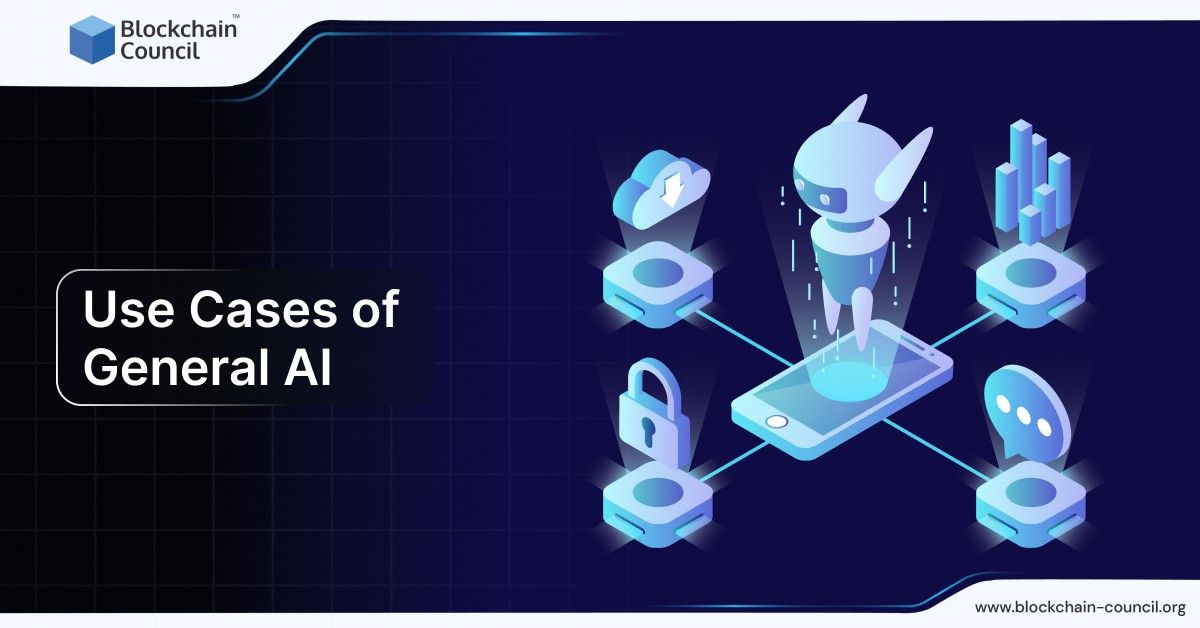
- Blockchain Council
- September 29, 2024
General Artificial Intelligence (AGI), often known as strong AI, represents a complex concept that stands apart from the AI systems we’re familiar with, like chatbots or virtual assistants. These existing systems are typically built for particular tasks, whereas AGI is designed to mirror human cognitive capabilities. It’s the type of AI often portrayed in science fiction—machines having intelligence similar to humans.
AGI would not just perform specific tasks but also learn from them and apply that understanding across various situations, similar to human thinking. Unlike narrow AI, which excels at specific tasks like image recognition or chess, AGI would have the ability to generalize and solve problems it hasn’t been trained on specifically.
Potential Uses of General AI
Customer Service
AGI could change customer service by making interactions more personalized and efficient. Imagine a service agent that not only responds to questions but also understands the tone of your voice, recalls past conversations, and anticipates what you need. An AGI system could assess massive amounts of customer data quickly, creating profiles that help predict and handle potential concerns before they arise. This approach could boost customer satisfaction by offering solutions that seem tailored to each individual.
Coding Intelligence
AGI could extend its abilities into software development, grasping the logic behind codebases and suggesting improvements. Unlike current coding tools, AGI could independently write new code, fix errors, and optimize programs without detailed guidance. For instance, a developer could ask AGI to build a function for calculating shipping costs based on various factors. The system would not only create the code but also explain the reasoning, making it simpler for developers to review and use.
Navigation and Autonomous Systems
Today’s autonomous vehicles rely on preset routes and sensor input, but AGI could push these systems further by enabling real-time understanding and adaptation to surroundings. An AGI-driven vehicle could respond to unexpected traffic and, instead of sticking to strict rules, assess data from other vehicles to find a better route. This adaptability would be crucial in areas like search and rescue, where conditions shift frequently.
Healthcare
AGI could revolutionize healthcare by examining extensive datasets from medical records, images, and genetic data, offering insights that might elude doctors. It could detect patterns that indicate a patient’s risk of certain conditions, recommend personalized treatments, and even foresee disease progression. Such abilities could lead to more precise and timely healthcare that aligns with each patient’s specific needs.
Financial Services
The financial world could gain from AGI’s data analysis skills. AGI systems could manage complex financial models, trading activities, and risk assessments by processing market data, news, and public sentiment. Unlike current AI, which needs precise instructions, AGI could apply what it learns from previous experiences to predict trends, identify risks, and advise on investment strategies, providing a new level of financial insight.
Education
In education, AGI could offer a customized learning experience that adjusts to each student’s learning style, knowledge, and progress. By continuously analyzing performance, AGI could change the difficulty of materials on the spot, keeping students engaged and appropriately challenged. This flexibility could lead to individualized learning paths, interactive exercises, and engaging content that makes learning more effective.
Research and Development
AGI could also reshape research by swiftly analyzing data, spotting trends, and generating new ideas. AGI could assist researchers by going through vast amounts of literature to find connections that might be missed otherwise. This capability could speed up research and open the door to breakthroughs in areas like medicine, physics, and environmental studies.
Key Players in AGI Research
OpenAI
OpenAI is a leader in AGI research, known for its large language models like GPT-4. These models have shown impressive abilities in understanding and producing human-like text, excelling in areas such as coding, math, and medical analysis. OpenAI’s emphasis on ethical AI aligns its goals with societal values, reinforced by its collaboration with Microsoft, which provides essential computing power.
DeepMind
DeepMind, part of Alphabet, is recognized for its success in reinforcement learning, a machine learning method where models learn optimal behaviors through practice. DeepMind’s projects, including AlphaGo and AlphaFold, showcase its capability to tackle complex challenges in diverse fields. However, merging these advancements into a cohesive AGI system remains a tough task.
Anthropic
Anthropic, founded by former OpenAI researchers, is a newer participant in the AGI landscape. The company is committed to creating safe and understandable AI systems aligned with human values. By emphasizing robust and dependable AI, Anthropic seeks to make AGI safer and clearer, focusing on controlled systems that align with societal goals.
IBM
IBM’s approach to AGI involves merging advanced AI with cognitive computing, exploring neuromorphic computing that mimics the human brain. IBM’s expertise in AI, particularly through its Watson platform, supports its AGI research, though keeping up with faster-moving competitors presents challenges.
Microsoft
Microsoft is deeply involved in AGI development through its investments in AI and its partnership with OpenAI. The integration of GPT models into Microsoft products highlights the practical uses of advanced AI. Microsoft’s vast computational resources, particularly through Azure, provide critical support for AGI research.
Technological Developments Pushing AGI Forward
Advanced Neural Networks
New neural network designs, like transformers, play a key role in AGI progress. These models, including large language models like GPT-4, can manage a wide range of tasks, such as generating text and solving problems, helping systems learn and generalize information similar to human reasoning.
Transfer Learning
Transfer learning allows AI systems to apply knowledge from one task to another, aiding in faster and more efficient learning. This adaptability is crucial for AGI’s goal of creating versatile intelligence.
Supercomputing and Real-Time Data Processing
AGI development depends heavily on supercomputers and advanced data processing. High-performance computing lets researchers train large AI models and run simulations that test AGI systems. These capabilities are vital for refining AGI before real-world application.
Conclusion
The potential applications of AGI, though theoretical now, could bring significant changes across industries. From enhancing customer service to advancing healthcare, education, and financial services, AGI could lead to major improvements in efficiency and decision-making. While achieving AGI involves overcoming various technical and ethical challenges, continued research keeps this ambitious goal within sight, with the promise of redefining our interaction with technology.





































































 Guides
Guides News
News Blockchain
Blockchain Cryptocurrency
& Digital Assets
Cryptocurrency
& Digital Assets Web3
Web3 Metaverse & NFTs
Metaverse & NFTs
